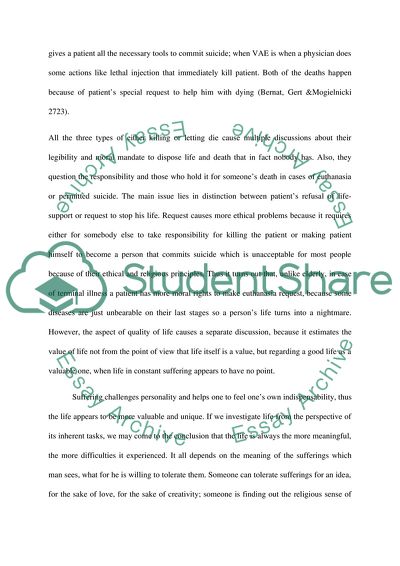Cite this document
(Is Euthanasia of Humans Ethical in the Case of the Terminally Ill and Essay Example | Topics and Well Written Essays - 1500 words, n.d.)
Is Euthanasia of Humans Ethical in the Case of the Terminally Ill and Essay Example | Topics and Well Written Essays - 1500 words. https://studentshare.org/health-sciences-medicine/1869215-is-euthanasia-of-humans-ethical-in-the-case-of-the-terminally-ill-and-the-elderly
Is Euthanasia of Humans Ethical in the Case of the Terminally Ill and Essay Example | Topics and Well Written Essays - 1500 words. https://studentshare.org/health-sciences-medicine/1869215-is-euthanasia-of-humans-ethical-in-the-case-of-the-terminally-ill-and-the-elderly
(Is Euthanasia of Humans Ethical in the Case of the Terminally Ill and Essay Example | Topics and Well Written Essays - 1500 Words)
Is Euthanasia of Humans Ethical in the Case of the Terminally Ill and Essay Example | Topics and Well Written Essays - 1500 Words. https://studentshare.org/health-sciences-medicine/1869215-is-euthanasia-of-humans-ethical-in-the-case-of-the-terminally-ill-and-the-elderly.
Is Euthanasia of Humans Ethical in the Case of the Terminally Ill and Essay Example | Topics and Well Written Essays - 1500 Words. https://studentshare.org/health-sciences-medicine/1869215-is-euthanasia-of-humans-ethical-in-the-case-of-the-terminally-ill-and-the-elderly.
“Is Euthanasia of Humans Ethical in the Case of the Terminally Ill and Essay Example | Topics and Well Written Essays - 1500 Words”. https://studentshare.org/health-sciences-medicine/1869215-is-euthanasia-of-humans-ethical-in-the-case-of-the-terminally-ill-and-the-elderly.


